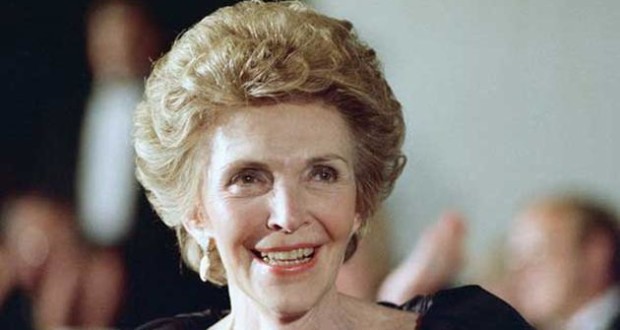The death of Nancy Reagan, widow of the late US President Ronald Reagan, was announced at the weekend. She was widely heralded in the press as a woman who had sacrificed her own career in order to support her husband and find fulfilment in being a “wife and mom” who cared about social causes and backed programmes to discourage young people from taking illegal drugs. Let’s not let her death go by without mentioning some of the other aspects of her life.
She was friendly with Hollywood actor Rock Hudson, famed for his portrayals of the heterosexual lead in many light-hearted rom coms. In real life, Hudson was gay and acquired the HIV virus: these facts were to shock Hollywood when they became known. The dying Hudson went to France to seek specialist treatment which he hoped might save, or at least prolong, his life. Before he could sort out admission to the hospital where treatment was available, he collapsed – and appealed to Nancy Reagan to help him cut through the red tape that was holding up his getting out of the emergency hospital and into the treating hospital. Papers in the Reagan Presidential Library show that Nancy’s response to the request was that “she did not feel this was something the White House should get into” (Guardian, 3rd February 2015).
The Reagans were certainly very much less than front runners on funding AIDS research and treatment – certainly until, not least because of Hudson’s death, pressure came from Hollywood to do so. Many gay rights campaigners consider the delay just plain homophobic. Historian Allida Black has said that the first time Ronald Reagan used the word “AIDS” in public was in 1987 – after 37,000 people had been diagnosed with HIV in the USA.
Nancy Reagan openly campaigned to discourage young people to stay away from drugs and is widely remembered for using the slogan “just say no”. Less well remembered is the fact that her campaign aimed to discourage youngsters from drinking alcohol too. The full slogan was: “Say yes to your life. And when it comes to drugs and alcohol just say no.” The campaign was extremely unsuccessful, with research showing that more subtle campaigns which acknowledged it was hard to avoid drugs were much more successful. Nancy’s approach held back those anti-drugs campaigns that were more successful as no one liked to criticise the President’s wife. Her campaign also had racist consequences. Police came into schools, supposedly to enforce a zero tolerance approach to drugs – but they soon moved on to enforcing zero tolerance of any misdemeanours or violations of school rules, leading to much higher arrests of black and Hispanic pupils than white ones. A further consequence of the zero tolerance approach was that dealing left the school campus and went into much seedier areas, further away from practical support.
One of Ronald Reagan’s main policy interests – on which, one assumes, he received excellent astrological advice – was nuclear weapons. He encouraged NATO to acquire Cruise Missiles – which the UK stationed at Greenham Common, where a women’s peace camp sprang up in non-violent protests. He also began a project he titled the “Strategic Defence Initiative”, which almost everyone else called “Star Wars”. Billed as a necessary means of defending the US, the fanciful system (very little of which came to fruition) of using ground and space based missiles to shoot down nuclear weapons was in fact intended to fuel arms spending and prompt another arms race (which would in turn fuel more arms spending).
Not everyone who has, this week, spoken of what a great support Nancy was to her husband in the White House has reminded readers that Nancy hired her own astrologer, Joan Quigley. Ms Quigley advised Nancy on whether it was a good or bad time to take important decisions on political and personal matters and sometimes even on what the decision should be. Nancy paid Ms Quigley through a third party, which was widely seen as having been intended as a way to stop the public finding out that the White House was taking astrological advice on government business.
Obituaries have stressed how Nancy Reagan was always well turned out and how she cared for her husband in his later years of life. There are many women who care for their husbands in their last years – and vice versa. Many carers worry about money, a lack of help and whether they will be able to continue to live in their family home or at least adapt it. Ms Reagan shared few of these worries: she and Ronald Reagan where millionaires, with a large house, staff and even a continuing income from the state after Ronald retired from office. Perhaps these factors helped her keep herself so well turned out.
None of this is to rejoice at the death of Nancy Reagan. But as her death triggers a brief spurt of reminiscences, let’s remember some of the down sides of the Reagan years and consider whether our own times are much of an improvement.
[Adverts]
 East London News A Force for the community…
East London News A Force for the community…




